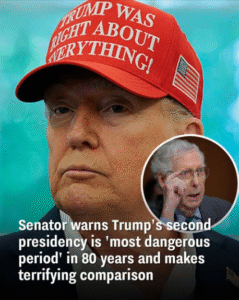Senator Mitch McConnell’s Warning: A Chilling Echo of History Amid Trump’s Second Presidency
In a moment of stark reflection, Senator Mitch McConnell—one of the longest-serving figures in American political history—has issued a grave warning about the current state of global affairs under President Donald Trump’s second term. As McConnell prepares to retire from public service, his final focus has shifted toward defense and foreign policy, and his message is clear: the United States is entering what he calls “the most dangerous period since before World War II”.
This statement, coming from a seasoned Republican and former Senate Majority Leader, carries weight not only because of McConnell’s stature but because of the historical comparison he draws—a parallel to the 1930s, a decade marked by economic collapse, rising authoritarianism, and the world’s descent into global conflict.
🕰️ A History-Haunted Warning
McConnell’s concerns center on a disturbing resemblance between today’s geopolitical climate and the prelude to World War II. He references the Smoot-Hawley Tariff Act of 1930, signed by President Herbert Hoover, which many historians believe exacerbated the Great Depression and accelerated global instability. McConnell draws a direct line from that era to Trump’s current tariff policies, suggesting that economic isolationism could once again have catastrophic consequences.
He invokes the term “America First”, a slogan used in the 1930s by isolationists who opposed U.S. involvement in European affairs. Today, the phrase has been revived by Trump and his allies, symbolizing a nationalist approach that McConnell believes risks alienating allies and emboldening adversaries.
“Those who were totally anxious to stay out of all of what was going on in Europe were called ‘America First.’ Sound familiar?” McConnell said.
🌍 A Coalition of Hostile Powers
McConnell’s warning is not limited to economic policy. He points to a growing coalition of authoritarian regimes—North Korea, China, Russia, Iran, and Iran’s proxies—as a unified threat to American interests. Though these nations differ in ideology and structure, McConnell argues they share one critical trait: “They hate us.”
This animosity, he suggests, is being inflamed by Trump’s foreign policy decisions, which he views as erratic and confrontational. The senator is particularly concerned about the war in Ukraine, warning that a Russian victory would have “huge worldwide implications” and could signal a broader decline in American influence.
“What we need to do is avoid the headline at the end of the war, ‘Russia wins, America loses,’” McConnell cautioned.
🛡️ Readiness or Recklessness?
In response to these threats, Trump has proposed a controversial rebranding of the Department of Defense to the Department of War, signaling a shift from defensive posture to offensive readiness. Secretary of Defense Pete Hegseth supports the move, arguing that the U.S. won both World Wars under a War Department, not a Defense Department.
“We’re not just defense, we’re offense,” Hegseth declared on Fox News.
While the rebranding may be symbolic, it underscores a broader shift in tone—one that McConnell views with apprehension. He questions whether the U.S. is truly prepared to confront the challenges posed by hostile powers, especially when domestic divisions and international isolation threaten to weaken its strategic position.
🧠 McConnell’s Legacy and Final Mission
At 83, McConnell is nearing the end of a political career that began in 1984. He has weathered decades of partisan battles, legislative negotiations, and shifting political landscapes. But in his final chapter, he has chosen to focus on what he believes is the most pressing issue: global security.
His remarks are not merely political—they are deeply personal. As someone who has witnessed the Cold War, the rise of terrorism, and the evolution of global alliances, McConnell’s warning is rooted in experience and historical awareness. He sees echoes of the past in today’s headlines and fears that the lessons of history are being ignored.
🔥 The Political Fallout
McConnell’s comments have sparked intense debate across the political spectrum. Supporters of Trump view the senator’s remarks as a betrayal, while critics see them as a courageous act of conscience. The comparison to the 1930s has drawn particular attention, with historians and analysts weighing in on the validity of the parallel.
Some argue that McConnell’s warning is hyperbolic, designed to stir fear and resistance. Others believe it is a necessary wake-up call, a reminder that democracy and stability are not guaranteed. In either case, the senator’s words have added a new layer of complexity to the national conversation about Trump’s leadership and America’s role in the world.
🧭 Navigating the Future
Whether one agrees with McConnell or not, his warning invites reflection. Are we repeating the mistakes of the past? Is economic nationalism a path to prosperity or peril? Can the U.S. maintain its global leadership in an era of rising authoritarianism and internal division?
These questions are not easily answered. But they demand attention—from policymakers, citizens, and global partners alike. McConnell’s message is not just about Trump; it is about the trajectory of a nation and the choices that will shape its future.
🕊️ A Sobering Reminder
In the end, McConnell’s warning is a call to vigilance. It reminds us that history is not a distant memory but a living guide. The 1930s were marked by complacency, division, and a failure to confront emerging threats. The result was a world engulfed in war.
Today, the stakes are different but no less serious. The tools of conflict have evolved—cyber warfare, economic coercion, and disinformation campaigns—but the underlying dynamics remain. Power, ideology, and resentment continue to drive global tensions.
McConnell’s voice, weathered by decades of service, urges us to look beyond the headlines and consider the deeper currents shaping our world. His warning may be unsettling, but it is also a testament to the enduring importance of foresight, unity, and historical awareness.
If you’d like, I can help you turn this into a speech, op-ed, or even a visual timeline comparing the 1930s to today.


